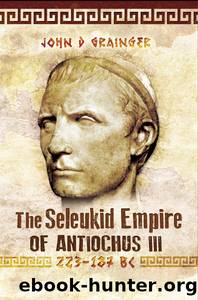The Seleukid Empire of Antiochus III by John D Grainger

Author:John D Grainger
Language: eng
Format: epub
Tags: HISTORY / Ancient / General
ISBN: 9781473854505
Publisher: Pen and Sword
Published: 2015-03-30T16:00:00+00:00
Chapter Seven
The Fifth Syrian War: Asia Minor
The use of the word ‘Syrian’ for this war, and its predecessors and successors, is so normal by now that it is inescapable, but at the same time it is misleading. Certainly Syria was at the heart of the conflict between the Seleukid and Ptolemaic kings, but it was not the only land over which they were in dispute. The fighting between the two states had ranged from the borders of Egypt to the coast of Thrace, and had involved every other kingdom and many cities around the eastern Mediterranean. The use of the term ‘Syria’ therefore serves to hide the wide extent of these wars.1
In the case of the Fifth War the Syrian section of the fighting was only the first part, from 202 to 199 or 198. The next part, in 197–195, took place in Asia Minor and Thrace, and by the end it was being overtaken by a growing crisis in the relations of Antiochos with Rome, and, classical historians being what they are, anything to do with Rome takes priority, so this aspect, certainly from the Roman point of view, has been studied at the expense of what Antiochos actually did. To Antiochos, however, this was not a major issue until well after the war with Ptolemy was over.
In 198 Antiochos stood victorious in Syria. He had gained control of the whole land as far as the borders of Egypt. He was then faced with a new choice. The Ptolemaic kingdom, though now deprived of Palestine and Phoenicia, still consisted of a large territory: Egypt and Cyrenaica, and numerous coastal places and islands in Anatolia and the Aegean. Some of the European places, of course, had now been taken by Philip, who had captured those he could reach in Thrace and the Chersonese; he was besieging Abydos on the Asian side of the Straits when Lepidus the Roman envoy caught up with him and delivered what was, in effect, a declaration of war. Earlier he had campaigned for a time in Karia, capturing cities from Ptolemy and from Rhodes. When he returned to Macedon, he found that the Roman declaration of war had arrived just as the Roman invasion forces were crossing the Adriatic.2 From the point of view of both the Ptolemaic and Seleukid kingdoms, both Rome and Philip were now so fully preoccupied with each other that they could be ignored.
Antiochos therefore had three options before him after his conquest of Koile Syria: he could go on to attack Egypt, or he could be content with what he had gained and make peace, or he could go back into Anatolia to pick up the remaining Ptolemaic possessions. He chose this last alternative. Probably he did not have to think long about it, but it is worth considering what reasons he might have. First, by the time he was free to leave Syria, sometime late in 198, the situation in the Aegean and Greece had clearly become critical. Philip
Download
This site does not store any files on its server. We only index and link to content provided by other sites. Please contact the content providers to delete copyright contents if any and email us, we'll remove relevant links or contents immediately.
Blood and Oil by Bradley Hope(1558)
Wandering in Strange Lands by Morgan Jerkins(1417)
Ambition and Desire: The Dangerous Life of Josephine Bonaparte by Kate Williams(1383)
Daniel Holmes: A Memoir From Malta's Prison: From a cage, on a rock, in a puddle... by Daniel Holmes(1328)
Twelve Caesars by Mary Beard(1313)
It Was All a Lie by Stuart Stevens;(1294)
The First Conspiracy by Brad Meltzer & Josh Mensch(1167)
What Really Happened: The Death of Hitler by Robert J. Hutchinson(1154)
London in the Twentieth Century by Jerry White(1145)
The Japanese by Christopher Harding(1130)
Time of the Magicians by Wolfram Eilenberger(1125)
Twilight of the Gods by Ian W. Toll(1115)
A Woman by Sibilla Aleramo(1092)
Cleopatra by Alberto Angela(1092)
Lenin: A Biography by Robert Service(1073)
John (Penguin Monarchs) by Nicholas Vincent(1068)
The Devil You Know by Charles M. Blow(1024)
Reading for Life by Philip Davis(1023)
The Life of William Faulkner by Carl Rollyson(980)
